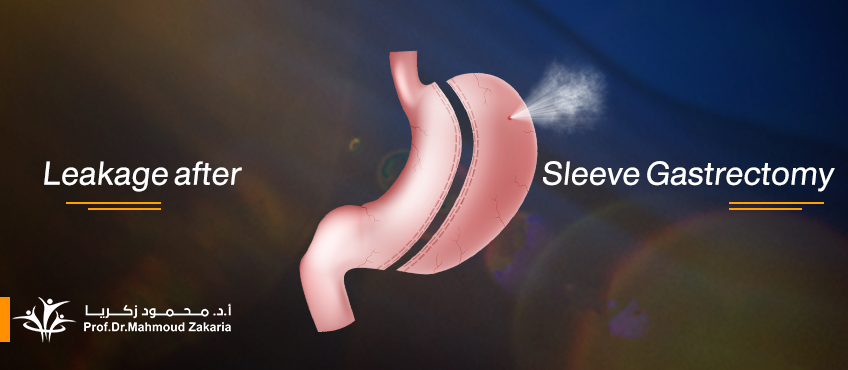Treatment of leakage after sleeve gastrectomy
What is Gastric Leakage?
Leakage is a possible complication after sleeve gastrectomy, but with the great development in the techniques of staplers used in the sleeve gastrectomy operation, there has been a significant decrease in the incidence of leakage after the operation, reaching 0% in much specialized obesity centers over the past years.
Gastric leakage is the occurrence of leakage of gastric juice and usually occurs due to a lack of healing at a point on the stapling line, resulting in peritonitis. Leakage is a serious complication of sleeve gastrectomy.
Gastric Leakage symptoms
- Constant and severe pain in the abdomen.
- High body temperature.
- Increased heart rate
- Shortness of breath.
- Abdominal distension.
If you experience any of these symptoms, you should contact your doctor immediately or go to the emergency room of the hospital in which the operation was performed.
Causes of leakage after sleeve gastrectomy
- Use of inferior staplers or staplers from an unreliable source in the operation.
- Pressure on the stomach wall after the operation occurs as a result of the patient violating the doctor’s instructions during the first 6 weeks after the operation, which is the period during which the stomach completely heals.
- Lack of experience and inefficiency of the surgeon, thus we recommend performing obesity surgeries with a surgeon who is specialized in obesity surgeries and does not practice any specialization in surgery except for obesity surgeries and has long experience in this type of specialized laparoscopic surgery.
What measures do we take to prevent leakage?
- We use the latest US staplers.
- We use the most modern stapler in the world – The Signia smart stapler
- We use modern high-resolution laparoscopy.
- Dr. Mahmoud Zakaria Elganzoury is an obesity surgeon specializing in bariatric surgeries only. He has performed more than 6,000 advanced obesity surgeries and is a professor in the Department of Bariatric Surgery at Ain Shams University, Cairo, Egypt.
- Dr. Mahmoud Zakaria makes a cover-stitching over the stapling, which limits the incidence of gastric sleeve complications such as bleeding, leakage, and stomach twist.
- The patient must adhere to the instructions and attend the follow-up appointments after the operation.
How is leakage diagnosed and treated after the sleeve gastrectomy?
leakage must be diagnosed and treated quickly and effectively, as delaying leakage treatment is very dangerous for the patient. In the event of symptoms of leakage, a CT scan with dye on the abdomen and pelvis should be performed urgently. CT scans are characterized by their high ability to diagnose leakage after sleeve gastrectomy.
Among the methods of treatment used:
– We may need to insert a stent into the stomach through the gastroscope to stop the leakage and remove the stent after the stomach has healed and the leakage has stopped.
– The use of antibiotics is preferably intravenous.
– In cases of leakage, the doctor advises, in most cases, to stop drinking and eating, and to rely on nutrition through saline solutions until the stomach stent is fitted.
– In some cases, the patient may need surgical intervention.
We recommend that obesity surgeries be performed in a specialized center by an experienced surgeon who uses modern staplers and follow the surgeon’s instructions after the operation to avoid any complications after the operation.
Related Topic: Sleeve gastrectomy for first-degree obesity patients
Sleeve gastrectomy and the appropriate date for pregnancy

